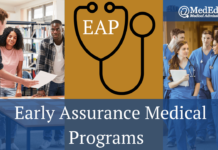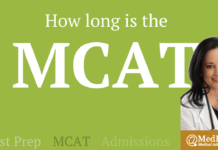PA School Requirements
If you’re passionate about providing medical care to those in need, a career as a doctor or nurse isn’t your only option. Ranked No. 1 on US News & World Report’s list of the 100 Best Jobs, a Physician Assistant (PA) can see patients, diagnose illnesses, and recommend treatment plans. Working alongside a licensed physician or surgeon, a PA offers many of the same services as an internist and earns a median salary of about $112,000.
Because physician assistants have the opportunity to make a difference while earning an impressive income, it’s no surprise that admission to PA schools is competitive.
Along with completing a bachelor’s degree, aspiring PAs will typically need to take various exams and build a robust applicant profile for consideration. Keep reading to learn about PA school requirements and discover what you can do to boost your odds of acceptance.
PA School Application Components
Most PA schools hold their applicants to rigorous requirements. If you want to become a physician assistant, expect to supply the following application components:
- Proof that you completed a bachelor’s degree
- Transcript and proof that you completed all the school’s prerequisite courses
- Description of extracurriculars
- GRE scores
- References letters
- Personal statement and/or essays
Depending on the school in question, you may also need to attend an interview to be considered for entry. It’s best to review all application requirements early in the process to ensure nothing falls through the cracks.
PA School Prerequisites and GPA
Because PA prerequisites vary by school, undergraduates are sometimes at a loss when it comes to choosing courses. However, you can be fairly confident that most programs will require you to complete the following classes before applying:
Science
- General chemistry: 2 semesters (1 lab)
- Biology: 2 semesters (1 lab)
- Microbiology: 1 semester (1 lab)
- Anatomy: 1 semester (1 lab)
- Physiology: 1 semester (1 lab)
Other
- English: 2 semesters
- Statistics: 1 semester
- Psychology: 1 semester
PA programs are competitive, so it’s a good idea to take additional coursework to make yourself a more desirable candidate. Here are some suggested courses for aspiring PAs:
- Organic chemistry: 1 semester (1 lab)
- Biochemistry: 1 semester (1 lab)
- Medical terminology: 1 semester
- Genetics: 1 semester
- Physics: 1 semester
- Sociology: 1 semester
- Foreign language: 2 semesters
For best results, research the specific requirements of your target schools. The last thing you want is to find yourself underprepared when it comes time to apply.
Additionally, students should take steps to ensure their GPAs are competitive at the schools on their lists. While some PA programs don’t provide GPA minimums, many list 3.0 as their cut-off for prerequisite courses. In other words, it’s important to put special focus on your grades for science courses.
The CASPA application will break up your GPA into the following categories:
- Overall GPA
- Science GPA
- Non-science GPA
- BCP (biology, chemistry, physics) GPA
Applicants should also note that the overall GPA of accepted PA students is 3.6, according to the 2020 Physician Assistant Education Association report. If you want to increase your odds of admission, it’s a good idea to make academic performance a priority. Here is the GPA breakdown:
Average GPA for PA School
First year undergraduate GPAs for first year PA students:
Average Science GPA: 3.52
Average Non-science GPA: 3.63
Average CASPA biology, chemistry, physics (BCP): 3.49
Average Overall GPA: 3.58
Standardized Testing for PA Applicants
Aspiring physician assistants should also expect to take standardized tests as part of the application process. A large percentage of PA schools require students to take the GRE, or graduate record examination. It’s important to note that you can take the GRE up to five times within a 12-month period, and only the scores you choose will be sent to your target schools.
For this reason, students should give themselves plenty of time to take and retake the GRE to ensure they earn the best possible scores. You may also want to consider signing up for a GRE prep test to boost your results and give yourself the best shot at being admitted to your dream school.
Average GRE for PA School
Average GRE for PA First Year Students
Verbal reasoning: 153.4
Quantitative reasoning: 152.8
Total: 306
Analytical writing: 4
Extracurricular Activities for PAs
Of course, students need more than impressive grades and test scores to gain admission to a PA school. The most desirable candidates also possess a robust extracurricular profile and experience in healthcare.
In fact, many of the top PA programs insist that accepted students possess direct patient care experience and other requirements. Here are some of the top extracurriculars to partake in if you hope to become a physician assistant:
Patient Care
The average PA school wants to know that students have a talent for caring for patients. Patient care is defined as direct patient care when you are responsible for a patient. As a result, many programs require students to earn patient care hours working as an EMT, CNA, physical therapy aid, or RN. If you want to increase your odds of acceptance at a PA school, look for opportunities to work directly with the people you will be treating in the future.
Patient care is the most important category of experience for PA admissions. The average number of patient care hours first year PA students had was 3240hours.
Patient care experience is defined by CASPA as: Patient Care Experience
Experiences in which you are directly responsible for a patient’s care. For example, prescribing medication, performing procedures, directing a course of treatment, designing a treatment regimen, actively working on patients as a nurse, paramedic, EMT, CNA, phlebotomist, physical therapist, dental hygienist, etc.
Healthcare Experience
PA schools also seek out students who have paid or volunteer experience in a healthcare setting. Healthcare experience is when you were not directly responsible for the patient. The difference between patient care and healthcare is that the former involves working directly with patients. Tasks like cleaning and delivering food typically qualify as healthcare work rather than patient care.
Healthcare experience is defined by CASPA as: Both paid and unpaid work in a health or health-related field where you are not directly responsible for a patient’s care, but may still have patient interaction; for example, filling prescriptions, performing clerical work, delivering patient food, cleaning patients and/or their rooms, administering food or medication, taking vitals or other record keeping information, working as a scribe, CNA (depending on job description), medical assistant, etc.
Average number of Healthcare Experience hours first year students had: 1791
Shadowing
PA programs want to admit students who know what to accept from the career. To that end, shadowing is one of the best extracurricular activities for aspiring physician assistants. While shadowing another PA is best, you can also gain valuable experience following a doctor or nurse practitioner.
Average number of “health care shadowing” hours first year students had: 215
Community Service
The best physician assistants are caring, generous, and compassionate, so it’s no surprise that PA programs look for applicants with a history of volunteering. While it’s great to donate your time in a healthcare setting, you can also mention charity work such as fundraising, tutoring, or working with a group like Habitat for Humanity.
Average number of community service hours first year students had: 719
Other Work Experience
CASPA allows students to list other paid employment unrelated to healthcare.
Average number of other work experience hours first year students had: 2315
Research
As is the case with medical schools, PA programs encourage students to participate in research endeavors. However, it’s important to note that research conducted for class doesn’t count as an extracurricular activity. You should only mention work done outside your schooling.
Average number of research hours first year students had: Not Listed
Leadership
Working as a PA means taking responsibility for patient care and treatment, so it’s only natural that students would seek out students with experience in leadership. This section of your extracurricular profile may also be a good place to highlight teaching experience. If you tutored students or worked as a TA while completing your degree, feel free to mention this in your application. The goal is to show colleges that you have the skill and experience to make decisions and act independently.
Average number of leadership hours first year students had: Not Listed








